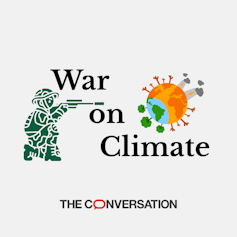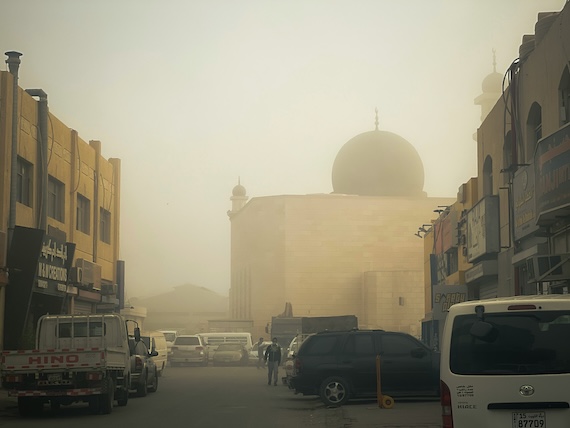By Marianna Poberezhskaya, Nottingham Trent University; Imad El-Anis, Nottingham Trent University, and Marwa Mustafa, Nottingham Trent University
(The Conversation) – The Middle East is experiencing a period of intense political and economic turbulence, with several countries in the region embroiled in conflict. These conflicts are taking place against the backdrop of an escalating climate crisis.
In 2023, global thinktank the Carnegie Endowment for International Peace concluded that Middle Eastern countries “are among the world’s most exposed states to the accelerating impacts of human-caused climate change – including soaring heatwaves, declining precipitation, extended droughts, more intense sandstorms and floods, and rising sea levels”.
The capacity of a society to receive, process and act upon climate-related information is at the heart of an effective climate change response. Media plays an important role: it is central to advancing public understanding of climate change and its connection to individual, communal and national security.
Yet over the past two decades or so, media coverage of climate change in the Middle East has been among the lowest in the world. According to the University of Colorado Boulder’s Media and Climate Change Observatory, media organisations in the Middle East each produced an average of around one article about climate change in August 2025 – compared with 66 articles for North American media in the same month.

Wars and climate change are inextricably linked. Climate change can increase the likelihood of violent conflict by intensifying resource scarcity and displacement, while conflict itself accelerates environmental damage. This article is part of a series, War on climate, which explores the relationship between climate issues and global conflicts.
The lack of climate coverage in the Middle East is because media outlets there face a number of structural problems. How does one talk about climate change when armed conflicts are spiralling out of control, or when public discourse is monopolised by what are perceived to be more pressing issues?
Jordan presents a useful example to help us understand these challenges and how to overcome them.
Media in Jordan
Jordan has long played a stabilising role in the Middle East. It has accepted large numbers of refugees from neighbouring conflicts and has acted as a mediator and peace broker between Middle Eastern rivals. However, climate change is threatening Jordan’s stability.
Raed Abu Soud, Jordan’s minister of water and irrigation, said in May 2025: “Jordan is grappling with one of the most severe water crises in the world, with per-capita water availability dropping to just 60 cubic metres per year.”
A host of other factors are worsening the situation. Economic underdevelopment in Jordan is leading to persistent unemployment and public unrest, while regional conflicts are undermining social cohesion.
How Jordan responds to the risks presented by climate change, and preserves its stability, is extremely important for the Middle East and beyond. Public understanding of this challenge is going to be pivotal to an effective response. And here enters the role of media.
Our research on climate change in Jordan has involved analysing more than 2,500 news articles in the country’s major print media and carrying out extensive interviews with local people. We have found that, while climate change is becoming a more important topic in the country, there are still many barriers preventing a coherent climate change discussion there.
It is common in Jordan, as in many other countries affected by conflict, for conversations related to climate change to be pushed to the background when other crises emerge. Since 2023, when the war in Gaza began, Jordanian media outlets have understandably been drawn to covering the humanitarian crisis there at the expense of climate change.
This has been exacerbated by the fact there are very few journalists in Jordan who work consistently on climate-related issues and can offer accurate and timely coverage. The shortage of climate journalists is a common problem across the Middle East.
When climate change is covered by Jordanian media, it is often discussed as a secondary consideration relative to geopolitical threats – not as a challenge in its own right. Due to the country’s policy of hosting refugees, Jordanian media outlets have often portrayed their country as a “second victim” of the civil war in Syria and the intractable Israel-Palestine conflict. Refugees are depicted as another strain on scarce resources.
Eroding trust
Climate change discourse in Jordan tends to be heavily influenced by international partners including foreign governments, charities and funding bodies.
There are numerous externally funded educational and vocational courses focused on climate change available in Jordan for various audiences, including media professionals. While this facilitates the advancement of climate change discussions, it can distance climate coverage from the local context and knowledge. This is particularly true if external partners merely “teach” Jordanians what they believe is necessary, without fully understanding the specific challenges Jordan faces.
It can also erode trust between Jordanians and these foreign partners. In some of the cases we studied, journalists in Jordan saw climate change as part of a western-imposed agenda aimed at controlling developing countries.

Photo by Arjun Lama on Unsplash
Jordan is highly important for the Middle East, Europe and beyond. Without effective climate adaptation, it risks losing its role as a refugee haven and regional stabiliser.
Media can play a vital role in advancing climate change discourse in the Middle East, both by holding governments to account and raising awareness of climate issues. Some studies suggest that public concern correlates with the volume of media coverage, and attention can fade when other issues dominate the media space.
Sustained, inclusive coverage is essential to ensure long-term engagement and informed public participation in climate action, even during times of political and economic turbulence.![]()
Marianna Poberezhskaya, Associate Professor in Politics and International Relations, Nottingham Trent University; Imad El-Anis, Associate Professor in International Relations, Nottingham Trent University, and Marwa Mustafa, PhD Candidate at the Centre for Research in Literature, Linguistics and Culture, Nottingham Trent University
This article is republished from The Conversation under a Creative Commons license. Read the original article.


 © 2026 All Rights Reserved
© 2026 All Rights Reserved